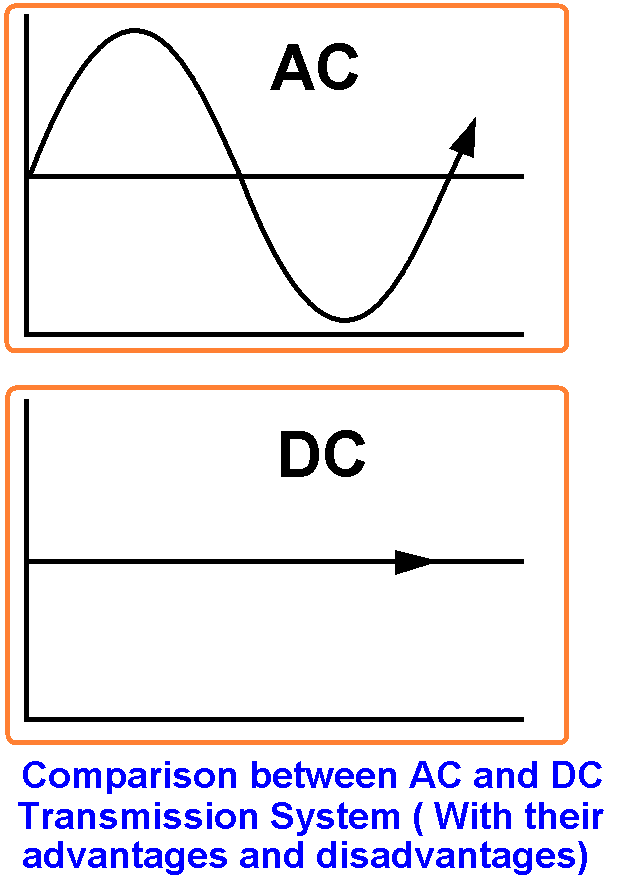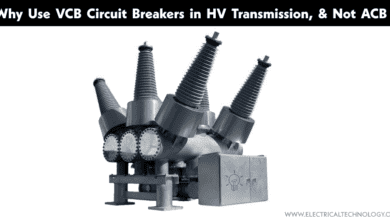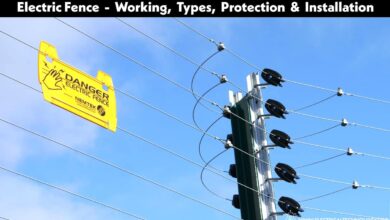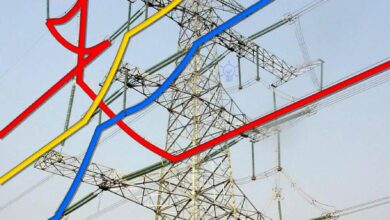Comparison between AC & DC Transmission Lines with their Advantages & Disadvantages
Electric power can be transmitted in both AC and DC for short and long transmission and distribution systems.
There are some advantages and disadvantages of both systems. Let’s discuss the technical advantages and disadvantages of both AC and DC power transmission lines systems.
- Related Post: What Happens When an AC Line Touches a DC Line?
DC Transmission:
In earlier times, the electric power transmission was done in DC due to the following advantages over AC.
Advantages of DC Transmission
- There are two conductors used in DC transmission while three conductors are required in AC transmission.
- There are no inductance and surges (High Voltage waves for a very short time) in DC transmission.
- Due to the absence of inductance, there are very low voltage drop in DC transmission lines as compare to the AC (if both Load and Sending end Voltage is same)
- There is no concept of Skin effect in DC transmission lines. Therefore, a conductor having a small cross sectional area is required in the DC transmission line.
- A DC System has a less potential stress over an AC system for the same Voltage level. Therefore, a DC line requires less insulation.
- In the DC System, there is no interference with other communication lines and systems.
- In the DC Line, Corona losses are very low as compared to the AC transmission lines.
- In High Voltage DC (HVDC) Transmission lines, there are no dielectric losses.
- In the DC Transmission system, there are no difficulties in synchronizing and related stability problems.
- The DC system is more efficient than AC, therefore, the rate of price of Towers, Poles, Insulators, and conductors are low so the system is economical.
- In DC System, the speed control range is greater than AC System.
- There is low insulation needed in the DC system (about 70%).
- The price of DC cables is low (due to low insulation).
- In the DC Supply System, the Sheath losses in underground cables are low.
- The DC system is suitable for High Power Transmission based on High Current transmission.
- In the DC System, The Value of charging current is quite low, therefore, the length of the DC Transmission lines is greater than AC lines.
Related Post: AC or DC – Which One is More Dangerous And Why?
Disadvantages of DC Transmission:
- Due to commutation problems, electric power can’t be produced at High (DC) Voltage.
- In High Voltage transmission, we can’t step-up the level of DC Voltage (As Transformer won’t work on DC).
- There is a limitation of DC switches and circuit breakers (and they are costly too).
- The motor generator set is used to step down the level of DC voltage and the efficiency of Motor-generator set is lower than a transformer.
- The DC transmission system is more complex and costly as compared to the AC transmission system..
- The level of DC Voltage can not be changed (step-up or step-down) easily. So we can not get the desired voltage for electrical and electronics appliances (such as 5 Volts, 9 Volts 15 Volts, 20 and 22 Volts etc) directly from the transmission and distribution lines.
Related Post: Difference between AC Drives and DC Drives
AC Transmission:
Nowadays, the generation, transmission and distribution of electric power has mostly been in AC.
Advantages of AC Transmission System
- AC Circuit breakers are cheaper than DC Circuit breakers.
- The repairing and maintenance of the AC substation is easier and inexpensive than DC Substation.
- The Level of AC voltage may be increased or decreased by using step up and Step down transformers.
Related Post: Why Does A Capacitor Block DC But Pass AC?
Disadvantages of AC System
- In the AC line, the size of the conductor is greater than the DC Line.
- The cost of AC transmission lines is greater than DC Transmission lines.
- Due to skin effect, the losses in the AC system are more.
- Due to the capacitance in AC transmission lines, a continuous power loss occurs when there is no load on the power lines or line is open at all.
- There are some additional line losses due to inductance.
- More insulation is required in the AC transmission system.
- The corona losses occur in an AC transmission line system.
- AC transmission lines interfere with other communication lines.
- There are stability and synchronizing problems in the AC System.
- The AC transmission system is less efficient than the DC transmission System.
- There are difficulties in controlling the reactive power.
Related Post: Why Do Electronic Circuits Use DC Current instead of AC?
The above comparison shows that DC transmission system is better than the AC transmission system but still, the majority of power transmission is done in AC power lines due to cost and uses of transformers for changing the level of voltages at different levels for different purposes.
Although mercury arc rectifiers, thyratrons, diodes and semiconductors can be used to easily convert AC into DC and DC into AC. Therefore, some countries transmit the electric power through DC power lines. The range of these DC power transmissions is up to 100kV to 800kV+.
Good to know:
- Recently in China, a 12GW power was transmitted at 11kV DC over a distance of 3300km.
- In addition, the longest HVDC power transmission line in the world is 2385km in Madeira, Brazil.
Related Posts:
- Comparison Between Overhead & Underground Transmission Systems
- Differences Between HVAC and HVDC – Power Transmission
- Advantages of HVDC over HVAC Power Transmission
- Advantages & Disadvantages of 50 Hz and 60 Hz Frequency Power Supply
- Difference Between 50 Hz and 60 Hz Frequency System
- Difference Between 120V and 240V/230V AC Power Supply
- Difference Between Porcelain and Glass Insulators
- Stranded Wire vs Solid Wire. Which One is Best and Why?
- Difference Between Current Transformer & Potential Transformer
- Difference Between Single Phase and Three Phase Power Supply
- Advantages of Three Phase System Over Single Phase System
- Difference Between Active and Reactive Power – kW vs KVA
- Difference Between Grounding, Earthing and Bonding
- What is the Difference Between Neutral, Ground and Earth?
- Difference Between Power Transformers and Distribution Transformers?

 Difference Between Squirrel Cage and Slip Ring (Wound) Rotor
Difference Between Squirrel Cage and Slip Ring (Wound) Rotor Why Don’t Bug Zappers and Fly Swatter Bats Kill Humans?
Why Don’t Bug Zappers and Fly Swatter Bats Kill Humans? Why Use VCB Circuit Breakers in HV Transmission, & Not ACB?
Why Use VCB Circuit Breakers in HV Transmission, & Not ACB? Electric Fence – Working, Types, Protection & Installation
Electric Fence – Working, Types, Protection & Installation Why is the Position of Overhead Conductor Exchanged in a Transposition Tower?
Why is the Position of Overhead Conductor Exchanged in a Transposition Tower? Why is Live Line-Washing or Cleaning Done on Energized Power Lines?
Why is Live Line-Washing or Cleaning Done on Energized Power Lines?